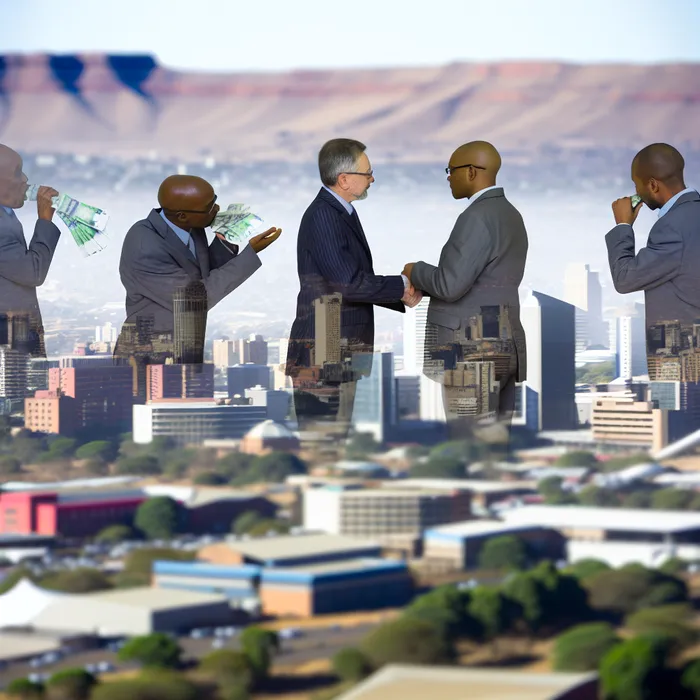
Corruption is not merely an economic or legal issue; it is fundamentally political. It emerges from development discourses that shape social realities through powerful narratives and material interventions.
Image: Sunday Independent/Ron AI
“Soundlessly collateral and incompatible: World is suddener than we fancy it.” — Louis MacNeice
THE lines from Louis MacNeice’s poem *Snow* highlight the complex and contradictory nature of reality. The image of snow and pink roses seen together yet separated by a window illustrates how disparate elements coexist silently, yet clash in unexpected ways.
This metaphor sets the stage for examining corruption — not as an isolated phenomenon, but as a deeply political concept.
Corruption is not merely an economic or legal issue; it is fundamentally political. It emerges from development discourses that shape social realities through powerful narratives and material interventions. Academic perspectives often describe corruption as an exchange mechanism between social position, economic wealth, and political status.
Economic wealth functions as a tool to access political systems, allowing marginalised groups entry into otherwise closed arenas. Whether such actions qualify as corrupt depends on their alignment with prevailing norms of legality and legitimacy.
Corruption also operates as a transformationary force — what some scholars call a “conveyor belt” — mediating between incompatible logics like tradition/modernity, local/national, and formal/informal. In this sense, corruption acts as both a medium of inclusion and exclusion. The stability of political orders reliant on such mechanisms hinges on societal structure, governance systems, and redistribution practices.
Thirdly, there is an implicit assumption, most notably by Scott, that modern professional associations have unproblematic access to political power. More simply, corruption is often a means of survival or enrichment. As Karl Polanyi observed, modern economies elevated gain as a central motive, legitimising profit-making as a social norm.
Exclamations like “if you’re poor, you’re stupid” reflect this mindset, suggesting that failure to enrich oneself when opportunity exists is a personal failing.
Until the late 1980s, corruption in developing countries was often seen as an inevitable, even beneficial, part of modernisation — a lubricant easing transitions and fostering growth. Harvard scholar Samuel Huntington once described it as a welcome aid to development.
In 1963, Wraith and Simpkins famously wrote: “Throughout the fabric of public life in newly independent states runs the scarlet thread of bribery and corruption… which flourishes as luxuriantly as the weeds it so much resembles.”
Bribery was accepted, legal, and even tax-deductible in many OECD countries — essentially, business as usual. It wasn’t until the 1990s that global institutions began treating it as a systemic threat. Then-World Bank President James Wolfensohn labelled it the “cancer of corruption”, placing it at the centre of development agendas.
Corruption is now understood as a structural problem tied to the sources, uses, limits, and accountability of power and wealth. It affects individuals and societies collectively, especially in contexts where professional autonomy is constrained by public-sector dependency.
The African Union (AU) declared 2018 the African Anti-Corruption Year under the theme: *Winning the Fight Against Corruption: A Sustainable Path to Africa’s Transformation.* AU Chairperson Moussa Faki Mahamat emphasised the need for collective action, stating: “Corruption hinders democratic governance, socioeconomic transformation, and peace. We must redouble our efforts; it is a scourge that cuts across all societies.”
Adam Smith’s moral philosophy offers insight into human behaviour. In *The Theory of Moral Sentiments*, he argued that humans desire not only to be loved, but to be lovely — to be morally attractive. He warned against blameworthiness, even when unnoticed.
Smith’s ideas helped build the foundation for cooperative societies where mutual benefit drives progress. Yet corruption contradicts this ideal. It reflects indifference to moral judgment, where shame vanishes even when caught, what Moeletsi Mbeki calls a particularly insidious form of decay.
Corruption is a complex, cross-border crime requiring collaborative solutions. As the proverb says, “one finger cannot kill a louse”.
Philosopher Kwame Gyekye, in his book *Tradition and Modernity*, proposes a *commitmental moral revolution* (CMR) as the solution to political corruption in Africa. CMR involves recommitting to existing moral values rather than overhauling them entirely. Gyekye distinguishes CMR from *substantive moral revolution* (SMR), which seeks to replace old moral frameworks. CMR assumes current values are sufficient but require renewed commitment.
Critics argue that CMR may be insufficient without addressing the social normalisation of corruption. While valid, CMR remains a necessary step toward change — even if not sufficient alone.
Gyekye defines political corruption as illegal, unethical exploitation of public office for personal gain. JS Nye echoes this, describing corruption as deviation from public duties for private ends. Unlike general wrongdoing, political corruption is committed by those in power — rulers, politicians, and officials. It includes not just bribery, but graft, fraud, nepotism, kickbacks, and misuse of public funds.
Fighting corruption requires more than individual reform; it demands collective moral resolve. South Africa, like much of Africa, needs not a one-man-led campaign, but a shared commitment to ethical renewal. Only then can the continent move toward genuine transformation.
* Dr Vusi Shongwe works in the Department of Sport, Arts, and Culture in KwaZulu-Natal and writes in his personal capacity.
** The views expressed here do not reflect those of the Sunday Independent, IOL, or Independent Media.
Related Topics: